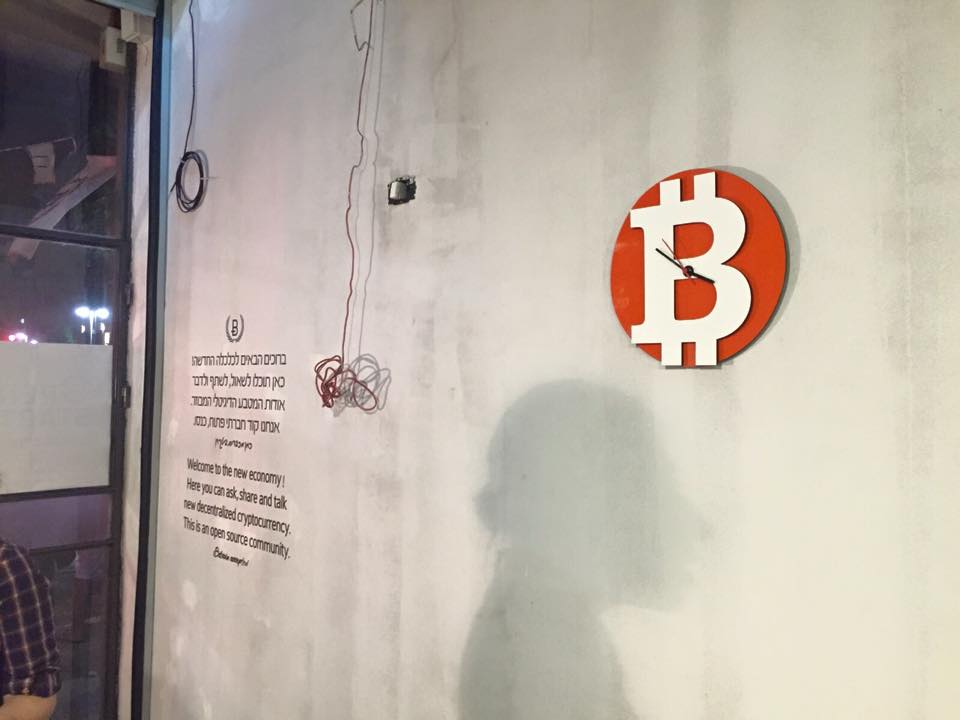A Peak Inside The Bitcoin Embassy Of Israel

It began as a joke days before the Architect Ayal Segev hung the sign “Bitcoin-Embassy” at his Tel Aviv office. This story, is told in a recent story at the Juedische Allgemeine in German by Sabine Brandes. CCN.com has re-formulated that piece for an English speaking audience.
Increasing numbers of people started coming in. On many days, 20 and more would gather at the christened Bitcoin Embassy.
“I must always clean up the space,” he remembers, grinning. Segev searched for a bigger office, and today he still runs the Bitcoin Embassy of Israel, one of the most successful Bitcoin embassies in the world.
Bitcoin enthusiasts meet there – mostly young men wearing jeans, sweatshirts and sneakers. They read there about bitcoins. Perhaps not everyone understands Bitcoin, but that’s okay – there’s opportunities to learn about the nascent crypto-currency. Every Sunday at 7pm, Bitcoin-Embassy representatives and those interested in Bitcoin join together to discuss the currency.
“Because [Bitcoin] is not only currency but also an entire value and belief system,” Segev said. “It is significant and fragile, because it has many errors that money also has.” However, while fiat currency is controlled by nations and corporations, Bitcoin is decentralized and thus controlled by no one.
“Bitcoin is a revolution in awareness,” Segev maintained.
Bitcoin today is no longer than only crypto-currency on the Internet. Alongside the first formulation of crypto-currency, there are today hundreds of crypto-currencies with their own traits and specialties.
A man who goes by Assaf – highlighting the possible dangers of using alternatives to fiat currency in Israel – uses it and promotes it in the name of social justice. “There is great inequality in the world in money. Because we are all crazy after it, more and more are printed and given away. Money is no longer tied to gold reserves, and therefore increasing people are always increasingly indebted.”
This is not possible with Bitcoin, Assaf argues. “It will develop in such a way that there will never be more than 21 million coins. Right now there are about 14 million in existence, and after the next seven million it will stop creating them,” he says.
Bitcoin, founded in 2009 by a pseudonymous man known only as Satoshi Nakamoto, has no central authority like modern banks and governments. Instead of names and identities, long addresses are used to send funds. Coins are mined through a special software – the Bitcoin protocol – and networked computer processes called “mining.”
The Bitcoin community in Israel represents one of the most active Bitcoin communities in the world. You might catch on some days groups of “crypto-enthusiasts” standing before the Embassy, under the Embassy sign, discussing the exchange rate of Bitcoin or watching a film about the crash of Wall Street. Inside, on a shelf hanging from a wall in the Embassy, there is a white ATM. It’s a Bitcoin ATM where people can exchange paper money for digital bitcoins.
“I do not like banks, I have fear about corruption and when I think about the indebtedness [of the world], I don’t feel so good about that. Therefore I use bitcoins, wherever I can, in order to a just world to create,” a woman going by Sarah said.
That people can purchase drugs and criminal wares on the darknet doesn’t bother the Bitcoin activists. Assaf states: “That the traditional war on Drugs has failed is no secret anymore.”
“Paying with bitcoins is not only ideology and idealism,” the author of the article, Brandes, writes. The article highlights that using Bitcoin can lower value transfer fees.
“I have myself recently used Bitcoins on Expedia to book a hotel,” Assaf said. “It was just like using a credit card, except without the three percent charge.”
Ayal, Assaf and Sarah are sure that Bitcoin is the currency of the future, they still keep traditional bank accounts and notes and coins in their wallets.
“Because we,” Sarah says laconically, “after all live in the real world still.”
Featured image from Facebook/Bitcoin EmBassy TLV .